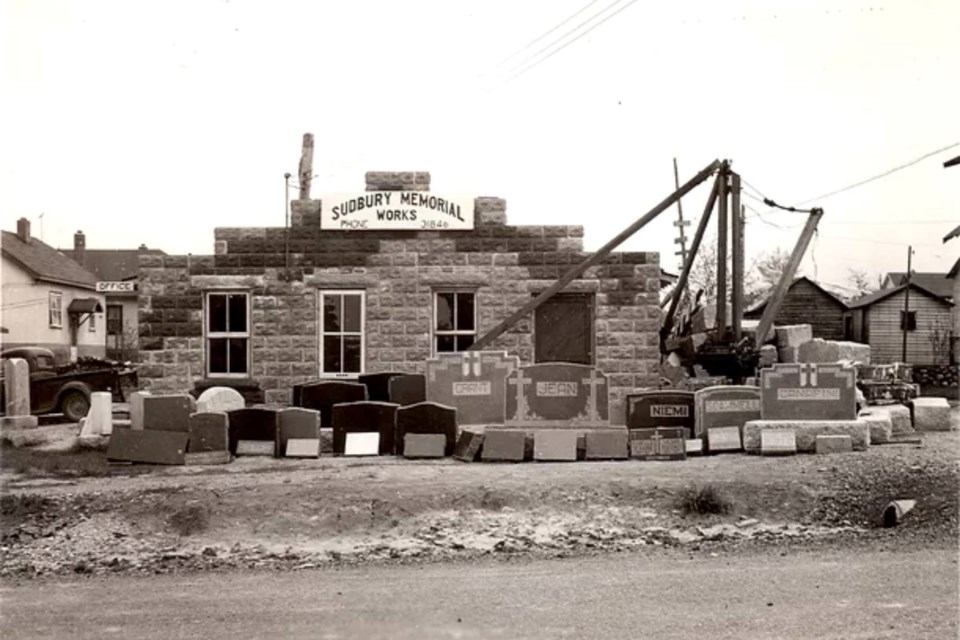Sudbury Memorial Works is a family-owned and operated business that has seen four generations of the Gunstone-Ruff family maintain the craftsmanship of stonework. Located on Arnley Street since 1930, it’s steps away from the Parklawn Cemetery in the city’s west end.
“It started with my great-grandfather, who returned to Sudbury after World War I and met Charles Gunstone, an accomplished memorial craftsman,” explained current owner Phil Ruff.
Gunstone had come from a long family of stone carvers in England and had found employment with a local monument company. He helped his friend Norm Ruff, Phil Ruff’s great-grandfather, to get a job in the monument business.
When Gunstone’s family came to Sudbury for a visit, they never did return to their homeland, and Ruff became part of the family when he married Gunstone’s younger sister, Winifred.
In 1930, Ruff started his own monument business after working with Gunstone for a decade. He called it Sudbury Memorial Works.
“He didn’t have any money; it was during the depression,” Ruff explained. “His first compressor was two old engines rigged together and he took an old delivery truck and turned it into a forklift. He was an inventor.”
Norm and Winifred Ruff had three sons: Paul (Phil Ruff’s grandfather), Robert and Jack. The two oldest, Paul and Robert, joined their father in the business, while Jack went off to university and never looked back. Paul joined his father as a partner in 1960. An internationally recognized, award-winning designer and craftsman, he served the memorial industry on many levels as president of monument builders' associations.
Paul and his wife Rae had two children, Karen and Paul Jr., and after his father retired in 1965, Paul took over the business. Paul Jr. started his own monument business in southern Ontario, while Karen, Phil’s mother, joined her father in the business in 1988, becoming owner in 1994.
“Growing up, I was always in the shop,” Ruff shared. “It was daycare and summer camp wrapped into one. PD days were a work day and I was a gopher for years.”
But his career aspirations during high school did not include taking over the family business.
Ruff was very involved with karate and travelled internationally for competitions. His mother insisted he get an education and he eventually took chef training at Cambrian College.
“I absolutely loved the kitchen, the excitement, creativity but did not like the horrible working conditions and low pay.”
While working at Deerhurst Resort in Huntsville, he met his wife, Yvonne, and they eventually decided to move to Sudbury where they could have a stable lifestyle to start a family. Today, both Ruff and his wife operate Sudbury Memorial Works. A career much like funeral services, monument creation allows him to help bring people peace and solace in their grief.
Want more business news from the North? Subscribe to our newsletter.
Ruff pointed out that no one needs to buy a monument; however, he has noticed the pandemic has created a unique drive to memorialize loved ones.
It is a creative process. Ruff describes the process similar to painting, with lots of prep work done before any carving begins. It is also a purchase most people do not have much experience with: “They don’t go with what they purchased the last time,” said Ruff.
Although business is healthy, there are fewer monument companies per capita than there were 50 years ago.
The process has not changed, although the carving techniques have modernized, including the use of rubber and sandblasting, and something called impact sketching.
“We use a diamond tip and lightly tap into the stone, like a tattoo,” Ruff said. “It’s a relatively new process starting in the ’80s in North America, whereas it was done by hand in my grandfather’s time.”
During the peak season in spring-summer they add another two full-time employees to address the demand.
They are very close with their employees. Turnover is bad for business since new employees must learn the craft from the ground up, and the reason why it has worked so successfully as a family business.
“We invest in our employees,” said Ruff. “We want them to be happy and healthy.”
Much like himself, Ruff’s daughter and son are working with their parents in the shop now. “My son who is now 15 is helping with carving and installation,” he shared.
